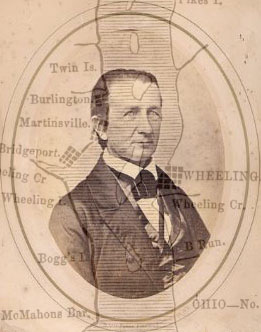A prosperous livestock breeder before the Civil War, Josiah William Ware (1802-1883) rubbed elbows with prominent political figures at his farm, Springfield Plantation, in Clark County, Virginia. But not even the perks of money and class could protect Ware from the vicissitudes of travel in early 19th-century America. Our modern highway traffic, cancelled flights and long airport security lines look rather pale in comparison to Ware’s experience of a journey home in 1837.
Embarking on the Ohio River from Maysville, Kentucky, as he reported in a letter to his cousin, Ware boarded a steamboat. . . which promptly broke its shaft. “We then got on another,” he continued, “which broke some part of her every morning making about 15 miles every night laying by in the day to repair & travelling at night.” As they struggled up the ice-laden river, “we burst some part of our machinery knocked off both chimneys, were on fire 3 times or 4 and was nearly capsized.” Ware and his fellow passengers were “at last compelled to foot it” at Wheeling, where they crossed over to Virginia (now West Virginia) in canoes. From there, both the number (and mood, no doubt) of the “crowd of passengers” made it “quite difficult to be entertained” as they found lodging scarce or nonexistent during the final leg of their nightmarish journey.
Ultimately, Ware took everything in stride. Calling himself “the Jonah of the travellers” (and perhaps thankful that no whales inhabited the Ohio River), he advised his cousin that if he was contemplating a journey, “never to associate yourself with so unfortunate a traveller as myself. You never will have good luck if you do.”
A finding aid and typescript of Ware’s letter can be accessed here. For more collections on travel in the Manuscripts & Folklife Archives section of WKU’s Department of Library Special Collections, search TopSCHOLAR and KenCat.

